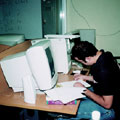

|
|
|
Appendix: Personnel & Enrollment
|



|
|
|||||||||||||||||||||||||||||||||||||||||||||||||||||||||||||||||||||||||
|
In addition to the degree programs and courses just described, the academic units of the School of Humanities and Social Sciences offer Arabic and Englishlanguage programs. Two programs offered through the Arabic Language Institute provide intensive Arabic language instruction for non-Arabic speakers. The Intensive English Program and English 111, Academic English for Freshmen, of the English Language Institute provide instruction for students who have been admitted into a degree program but who require further work to achieve the required level of English language proficiency. Professor: El S. Badawi (Director, Arabic Language Institute) The Arabic Language Institute is responsible for Arabic language instruction within the university's academic structure. It includes the university's TAFL (Teaching Arabic as a Foreign Language) M.A. program as well as regular nonintensive and accelerated courses in Arabic offered for academic credit. The Arabic Language Institute also administers two programs of intensive study of Arabic: the Intensive Arabic and the Center for Arabic Study Abroad (CASA) programs. These programs award program (but not academic) credit toward a degree at AUC. Students, however, may be able to obtain credit toward an academic degree at their home institution for their Intensive Arabic Language (ALIN) coursework. They should determine their institution's policy regarding transfer credit before coming to Cairo. The Arabic Language Institute offers intensive Arabic language courses for students, businessmen, diplomats, scholars, and others needing to gain a broad command of contemporary Arabic as quickly and as effectively as possible. For over sixty years, first through its School of Oriental Studies and then through its Center for Arabic Studies, AUC has taught Arabic to foreigners. Since the inception of what is now the Arabic Language Institute in the 1970s, this program has attracted students from the United States, Africa, Asia and Europe, offering intensive courses in both modern standard and Egyptian colloquial Arabic. A summer program is also offered. Intensive Arabic Language courses (ALIN) are part of the Arabic Language Institute's program. Students must register for a minimum of ten program credit hours per semester, while the normal course load is eighteen to twenty contact hours per week. All courses are taken for grades, and program credit is awarded as indicated at the beginning of each course listing. Students may receive up to nine undergraduate credits from AUC by petitioning the director of the program (see page 62 "Non-degree Academic Regulations" for transfers of credit to other universities). Elementary Level A student who successfully completes the first year of intensive study with the Arabic Language Institute can expect to possess a working competence in reading and writing modern standard Arabic and understanding and speaking Egyptian colloquial or modern standard Arabic. Intermediate Level Arabic is the chief medium of instruction. Students continue work in modern standard Arabic and Egyptian colloquial Arabic. Interested students may, at this level, begin to acquire familiarity with classical Arabic. Attention is given to the Arabic of print and broadcast media, while special lecture courses in Arabic are offered in response to the special interests of the students, such as Middle Eastern economics and politics, business correspondence, medieval and modern Arabic literature. Students who complete this second year of study should be able to read and write modern standard Arabic with some fluency, to pursue study in topics that specially interest them in Arabic, and to converse freely in Arabic. Intermediate-level students will also have had an opportunity to acquire vocabulary and terminology related to such special fields of interest as business and diplomacy. Advanced Level Certificate and Program Requirements Intensive Summer Program Director: M. K. Abdel Salam The Arabic Language Institute offers an intensive summer program from the first week of June until the beginning of August. Students must take twenty hours of class per week to be considered full-time. The summer curriculum includes either Modern Standard Arabic (MSA) and Egyptian Colloquial Arabic (ECA) at all levels, or Modern Standard Arabic only, both options as a full load. In addition, a number of electives is also offered out of which each student may take up to two. A total of ten program credits may be earned in the summer toward the Arabic Language Institute certificate. Extra Curricular Activities/Trips and Cultural Programs An integral part of the intensive language program is an extensive series of tours of Cairo and trips to the less easily visited sites of interest all over Egypt. These are accompanied by very efficient guides. While the institute subsidizes a large portion of the expenses, including transportation and entrance fees, students are required to pay for their food and lodging. The Arabic Language Institute cultural program also includes a cultural component featuring activities such as calligraphy, music and folkloric dance. In addition, seasonal activities, such as Christmas and Ramadan parties, are organized with the active participation of the students. Besides the above activities, in the summer semester the Arabic Language Institute offers a series of weekly lectures covering the cultural, educational, economic and political aspects of life in Egypt. Arabic Language Intensive Courses (ALIN) Professor: El S. Badawi (Director, Arabic Language Institute) ALIN courses are listed sequentially by area. In this three digit system, the first digit represents the level of the course: 1 for elementary, 2 for intermediate, and 3 for advanced. Prerequisites are not listed for every course. However, entry into all intermediate and advanced courses presupposes that the student is of intermediate or advanced standing. The instructor's permission may also be required. Standing will be determined by written and/or oral placement tests for incoming students and sometimes for continuing students.
|
|||||||||||||||||||||||||||||||||||||||||||||||||||||||||||||||||||||||||
|
|
|||||||||||||||||||||||||||||||||||||||||||||||||||||||||||||||||||||||||
|
Arabic Language Credit Courses (ALNG) All Arabic language credit classes at AUC are administered and taught by the Arabic Language Institute . Up to nine AUC credits may be received for Arabic Language courses in any one academic semester. Exceptions for additional credits may be granted only by the chair of the department. For details of university Arabic language requirements, see the "General Academic Requirements" |
|||||||||||||||||||||||||||||||||||||||||||||||||||||||||||||||||||||||||
|
|
|||||||||||||||||||||||||||||||||||||||||||||||||||||||||||||||||||||||||
|
Director, English Language Institute: Y. El-Ezabi While the English Language Institute offers the master's and diploma programs in TEFL as described under "Fields of Study," the institute was founded in 1956 to offer intensive English language courses in its Intensive English Program (IEP) to prepare non-native speakers of English for study at the undergraduate and graduate levels in the university. In addition, the institute offers English 100, Academic English for Freshmen, which serves as a bridge between the IEP and the Freshman Writing Program. The intensive program for undergraduates offers English 98 (Intermediate English), and English 99 (Advanced English). Students are placed in one of the two levels according to their scores on the AUC English Language Proficiency Entrance Test (ELPET) or TOEFL with TWE. Undergraduate students in the Intensive English Program (IEP) are allowed to take up to a full calendar year to reach the freshman English level (ENGL 100 or ECLT 101,102). For example, students entering the IEP in the spring who do not reach the freshman English level by the end of that semester may attend the summer session and the following fall semester. If at the end of one calendar year a student still has not attained the required freshman level, he/she will be suspended.† Content of Courses Attendance Suspension Academic English for Freshmen (ENGL 100) English 100 is a concurrent course in which classes meet five days a week for a total of fifteen hours. A student who for any reason misses thirty-six hours (12 days) will be dropped from the course. A student who is dropped will be allowed to retake the course the following semester. Sessions are devoted to the comprehension and summary of university-level texts, the writing of essays on science and humanities topics and remedial grammar within the context of individual teacher-student conferences. Freshmen taking English 100 may enroll in no more than two academic courses with a maximum of 7 academic course credits. Any student who withdraws from English 100 must withdraw from the two other academic courses. For new students, placement in academic English for freshmen is determined by their score on the ELPET or TOEFL with TWE. For students enrolled in the intensive English program, placement in Academic English for Freshmen is determined by their score on the IEP exit test. All students who have been admitted into ENGL 100 must satisfactorily complete the course work within a time period not to exceed two semesters. |